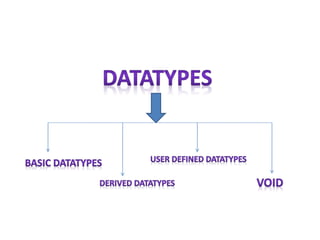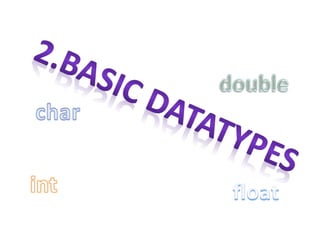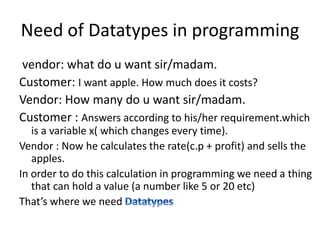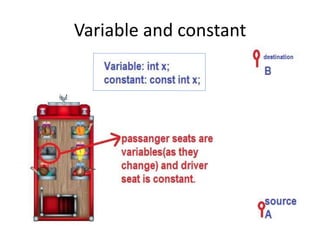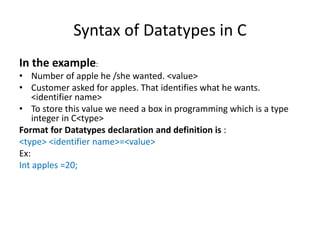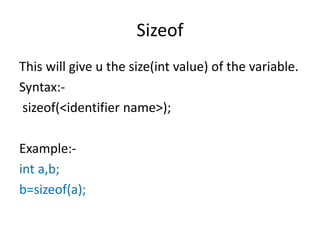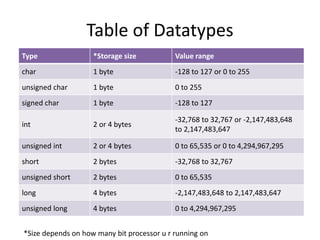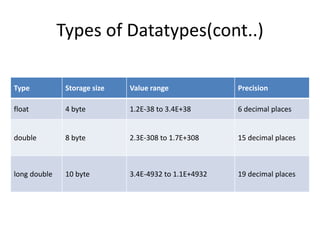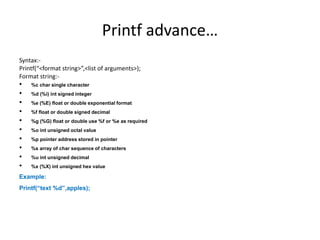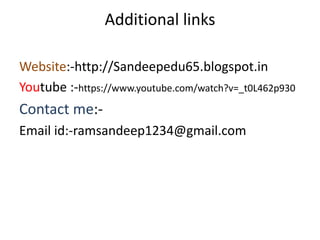Datatypes
- 4. Example :- When customer goes to a fruit vendor….
- 5. Need of Datatypes in programming vendor: what do u want sir/madam. Customer: I want apple. How much does it costs? Vendor: How many do u want sir/madam. Customer : Answers according to his/her requirement.which is a variable x( which changes every time). Vendor : Now he calculates the rate(c.p + profit) and sells the apples. In order to do this calculation in programming we need a thing that can hold a value (a number like 5 or 20 etc) That’s where we need
- 7. Syntax of Datatypes in C In the example: • Number of apple he /she wanted. <value> • Customer asked for apples. That identifies what he wants. <identifier name> • To store this value we need a box in programming which is a type integer in C<type> Format for Datatypes declaration and definition is : <type> <identifier name>=<value> Ex: Int apples =20;
- 8. Types of Datatypes Datatype Use to hold Example int for integer range numbers -5 float for decimal range numbers 99.99 char for character numbers A double for more precision decimal numbers 99.999999 * Long <datatype> for hold big numbers 34,333 * short <datatype> for value inside 32,768 8987 signed <datatype> **for only positive numbers 88 Unsigned<datatype> **for positive and negative numbers -96 •Except char Datatype. •In char we have -128 t0 127 range for unsigned char and 0 to 255 for signed char
- 9. Sizeof This will give u the size(int value) of the variable. Syntax:- sizeof(<identifier name>); Example:- int a,b; b=sizeof(a);
- 10. Table of Datatypes Type *Storage size Value range char 1 byte -128 to 127 or 0 to 255 unsigned char 1 byte 0 to 255 signed char 1 byte -128 to 127 int 2 or 4 bytes -32,768 to 32,767 or -2,147,483,648 to 2,147,483,647 unsigned int 2 or 4 bytes 0 to 65,535 or 0 to 4,294,967,295 short 2 bytes -32,768 to 32,767 unsigned short 2 bytes 0 to 65,535 long 4 bytes -2,147,483,648 to 2,147,483,647 unsigned long 4 bytes 0 to 4,294,967,295 *Size depends on how many bit processor u r running on
- 11. Types of Datatypes(cont..) Type Storage size Value range Precision float 4 byte 1.2E-38 to 3.4E+38 6 decimal places double 8 byte 2.3E-308 to 1.7E+308 15 decimal places long double 10 byte 3.4E-4932 to 1.1E+4932 19 decimal places
- 12. Printf advance… Syntax:- Printf(“<format string>”,<list of arguments>); Format string:- • %c char single character • %d (%i) int signed integer • %e (%E) float or double exponential format • %f float or double signed decimal • %g (%G) float or double use %f or %e as required • %o int unsigned octal value • %p pointer address stored in pointer • %s array of char sequence of characters • %u int unsigned decimal • %x (%X) int unsigned hex value Example: Printf(“text %d”,apples);
- 15. Additional links Website:-http://Sandeepedu65.blogspot.in Youtube :-https://www.youtube.com/watch?v=_t0L462p930 Contact me:- Email id:-ramsandeep1234@gmail.com

